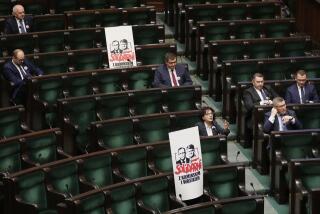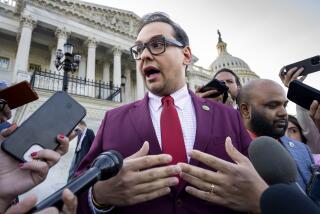Not All Communists Were Criminals : Czechoslovakia: A law meant to keep former party members out of government may destroy innocent lives.
Czech President Vaclav Havel remains one of the worldâs most respected and popular leaders, as his reception in the United States proved, but all is not well with his âvelvet revolution.â
Troubling new legislation that effectively bans former Communists from employment within state bodies, passed in October by the elected parliament and reluctantly signed by Havel, threatens an indiscriminate witch hunt. Such legislation would be unfortunate anywhere, but especially so in Czechoslovakia, a country with strong democratic traditions that should be the standard-setter for its neighbors.
The law stipulates that people who held certain positions in the security police or the Communist Party between Feb. 25, 1948 (the start of communist rule), and Nov. 17, 1989 (the beginning of the revolution), may not hold administrative posts in the government, the military and certain other official bodies, including universities and courts. It precludes from these jobs people who held posts in the Communist Party from the district level up and all members of the voluntary peopleâs militia, among other groups. The law is also directed against secret-police collaborators and those listed in police files as agents, informers or ideological collaborators.
The law puts the burden of proof on the individual seeking a high-level job. Applicants must present an affidavit or certificate from the interior ministry stating that they were not involved in the proscribed activities in the past. Those already holding high posts must submit a certificate within 30 days. An independent commission set up by the interior ministry is to verify questioned findings, hear complaints and call witnesses in closed sessions.
Earlier this year, the Parliament set up a commission to weed out former police collaborators from its ranks. Members whose names were listed in secret-police files were asked privately to resign from Parliament. If they refused, their names were read aloud in the federal assembly. Several parliamentarians thus affected proclaimed their innocence of collaboration, but had no way to clear their names.
Many of my friends from Czechoslovakia have told me that their country would have been better off if the police files had been destroyed at the time of the revolution. Marriages and friendships have broken up. One young man reportedly went into a deep depression after discovering that 22 of his friends had been reporting on him. Some declined to review their files.
The present atmosphere of vindictiveness is especially ironic, given the high moral tone that Havel initially set for Czechoslovakia. âWe cannot lay all the blame on those who ruled before,â Havel asserted in January, 1990, ânot only because this would not be true but also because it could detract from the responsibility each of us now faces.â
There is no question that the post-revolutionary government in Czechoslovakia has the right and duty to punish those guilty of violating national or international law in their past capacities. And there is no doubt that the concern of parliamentarians about weeding out secret communists who might undermine the struggle for democracy is a real one. This is not a witch hunt without witches. But blanket condemnation of people by association, rather than by their actions, is a dangerous course.
Each case should be treated individually, with ample opportunity to appeal to an independent court of law. False information may have been planted in files and some people may have been blackmailed or tortured into collaboration. Others may have joined the proscribed organizations yet never done anything illegal.
Above all, it should be proved that the person who is charged committed a crime (such as repressing the rights of dissidents) or violated international human rights law, and is not being persecuted merely for having belonged to a now-discredited group.
More to Read
Sign up for Essential California
The most important California stories and recommendations in your inbox every morning.
You may occasionally receive promotional content from the Los Angeles Times.










